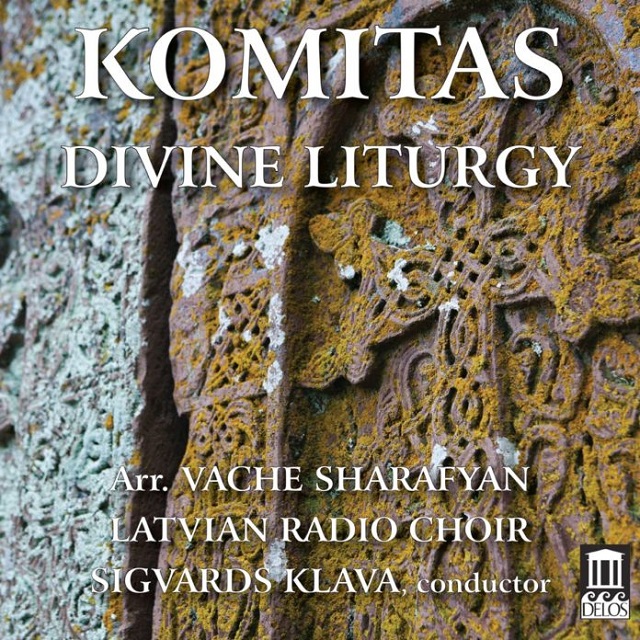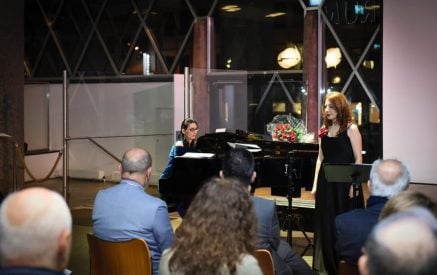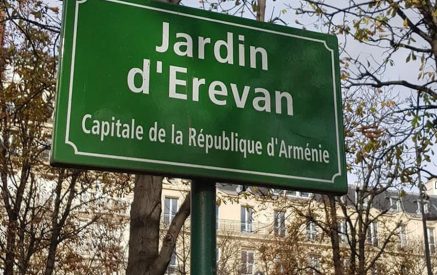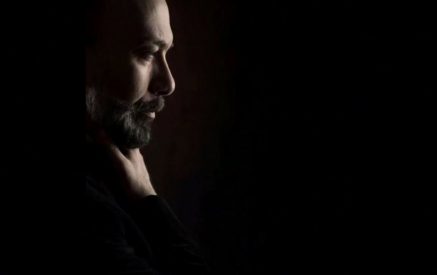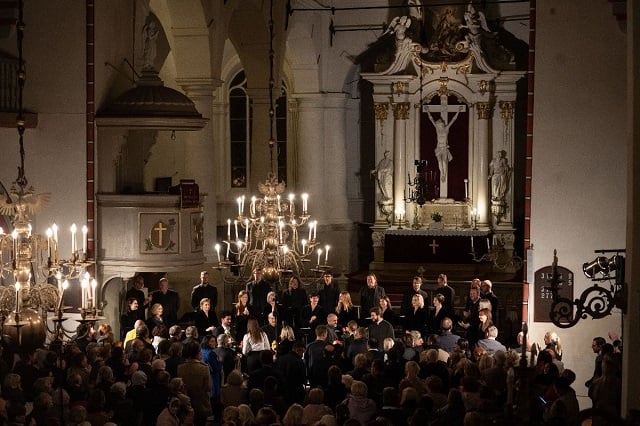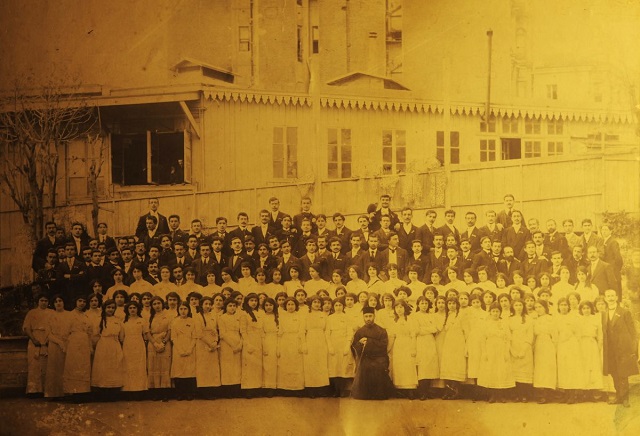The Armenian Mirror-Spectator. NEW YORK — On July 10, Delos released “Komitas: Divine Liturgy”, an early-20th masterpiece by the revered Armenian composer Komitas Vardapet (1869–1935), in the world-premiere recording of a mixed-voice arrangement by his 21st-century compatriot Vache Sharafyan. This new version features the critically acclaimed Latvian Radio Choir led by its artistic director, Sigvards Klava, with guest soloists bass Hovhannes Nersesyan and tenor Armen Badalyan.
The recording was made at St. John’s Church (Sv. Jana Baznica), Riga, Latvia, September 20–23, 2019.
It is impossible to overstate the significance of Komitas Vardapet’s music to the Armenian identity. “For Armenians, music is memory,” wrote Michael Church in The Guardian. “And whenever they gather to honor their dead—as Armenians all over the world do on Sunday, April 24, to commemorate the anniversary of the 1915 genocide in which 1.5 million Armenians in Turkey were either slaughtered or died on forced marches into exile — the songs they sing are by Komitas Vardapet, the composer who speaks for the soul of their nation.” Komitas, a priest and an eminent ethnomusicologist, was himself a victim of the Armenian Genocide. Though he survived, his psyche was shattered, and he spent most of his life’s last two decades in exile in a Paris asylum.
Komitas began working on the Divine Liturgy in 1892, and at least ten versions exist. The final version—the one presented on this recording — dates from 1914–15 and was completed just before his deportation from Constantinople, where he had settled in 1910, to a prison camp in Cankin. The Liturgy is thus one of his final works. Komitas’ output was modest: 80 choral works and songs, arrangements of the Armenian mass, and some dances for piano. And yet he singlehandedly laid the foundation for Armenia’s classical tradition, as his better-known compatriot Aram Khachaturian acknowledged. As a collector and arranger of the authentic folksongs of rural peasants, Komitas did for Armenia what Bartók did for Hungary, turning simple material into bewitchingly sophisticated polyphony. Komitas collected, transcribed, researched and compared more than 3,000 pieces of Armenian folk music, more than half of which were subsequently lost and only around 1,200 are now extant. His appetite for songs was voracious, and his transcriptions reflect a remarkable ear, seamlessly interweaving threads of music, movement, and complex social relationships.
Read also
The Divine Liturgy was originally composed for a male choir, and previous attempts over the years to transcribe it for mixed-choir performance were not enthusiastically received. But Tigran Mkrtchyan, the Armenian ambassador to Latvia, Lithuania and Estonia, believed a new concert version would bring more listeners to the masterwork, encouraging them to concentrate more on the music itself and the logic of its dramaturgy rather than on its ritual aspect.
Sharafyan’s arrangement follows the original male-choir version as closely as possible, with the female voices lending it extra color and brightness.
The project took three years of preparation, and finally, on September 20, 2019, the Latvian Radio Choir, led by its artistic director, Sigvards Klava, became the first non-Armenian mixed choir to perform the Divine Liturgy, in an historic performance at St. John’s Church in Riga commemorating the 150th anniversary of Komitas’s birth. This recording took place during the three days following that historic performance.
One of Armenia’s major composers, Vache Sharafyan has created more than a hundred musical works. His music has been praised as “stark, mysterious and ultimately majestic” by the New York Times, and “complex, deliberate, captivating” by the Boston Globe. His output includes symphonic works, chamber music, and choral and other vocal music. His compositions include the opera “King Abgar,” and the ballets “Another Moon” (inspired by G. I. Gurdjieff), “Ancient Gods” and The “Bride of the Desert.” Sharafyan’s compositions have been widely performed in his native country, but also internationally in the world’s most prestigious halls and by many contemporary music festivals in the United States and Europe.
About the Artists
Bass Hovhannes Nersesyan is both a priest and an opera singer. A graduate of the Komitas State Conservatory of Yerevan, since 2004 he has been a soloist at the Armenian National Academic Theatre of Opera and Ballet, and he also serves as a deacon in the Araratian Pontifical Diocese, one of the largest dioceses of the Armenian Apostolic Church. He has been a prize winner at many prestigious vocal competitions: the International Competition of Young Singers in Moldova, the International Young Opera Singers’ Competition “Opera Without Borders,” the Rimsky-Korsakov International Competition of Young Opera Singers, and the International Pavel Lisitsian Competition of Vocalists. In 2014 he was awarded the Armenian President’s Youth Prize for young musicians. Nersesyan has given concerts around the world and taken part in several international festivals.
Tenor Armen Badalyan studied violin at the Music College of Vanadzor in Armenia, and in 2003 he enrolled at the Komitas State Conservatory of Yerevan, from which he graduated as a voice teacher and opera singer. He has been a soloist at the Armenian National Academic Theatre of Opera and Ballet since 2008, and a member of the Tsaritsynskaya Opera Theatre (Volgograd, Russia) since 2013.
Since 1992, Sigvards Klava has been artistic director of the Latvian Radio Choir, which under his leadership has become an internationally recognized, vocally distinctive group welcomed at the world’s top music festivals and regularly invited to collaborate with outstanding composers and conductors. He has received the Latvian Great Music Award several times and is also a recipient of the Latvian Cabinet of Ministers Award and the Order of the Three Stars. He has served as a principal conductor of the Latvian Song and Dance Festival since 1990 and as a professor in the conducting department at the Latvian Academy of Music since 2000, and he takes regular part in international juries and educational projects. Klava has conducted concerts at the Royal Albert Hall in London, the Elbphilharmonie in Hamburg, the Concertgebouw in Amsterdam, the Berlin Philharmonie, and many other venues, with ensembles such as the Netherlands Radio Choir, the Netherlands Opera Choir, the Netherlands Chamber Choir, the Cappella Amsterdam, Berlin’s RIAS Chamber Choir, and the MDR Leipzig Radio Choir.
The Latvian Radio Choir is a unique ensemble of professional singers that offers its audiences an extraordinary variety of repertoire. ranging from early music to the most sophisticated contemporary scores. Its recording of Arvo Pärt’s Adam’s Lament, conducted by Tõnu Kaljuste on the ECM label, won the Grammy® Award for Best Choral Performance in 2014. The choir is a repeat winner of the Great Music Award of Latvia (the highest national award for professional achievement in music) and has also received the Latvian Cabinet of Ministers Award. Its account of Sergei Rachmaninoff’s All-Night Vigil (Ondine) was praised by Gramophone as the best recording of February 2013 and was ranked among the 25 best albums of the year by America’s National Public Radio network. In January, 2020 the Latvian Radio Choir won the International Classical Music Awards (ICMA) Award in the Choral category for their album of sacred choral works by Pyotr Tchaikovsky.




















































